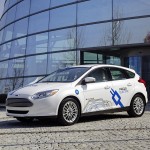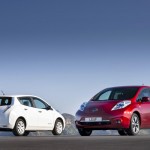Eco-friendly cars have long been a good investment for Londoners. Driving an electric vehicle means you are exempt from both congestion charges and VED (road tax) both pet hates of the average motorist. There are an abundance of charging points around the City and local government offer a grant that will give you up to 75 per cent off the cost of installing a domestic charge point. With no fuel charges and the majority of car journeys in and around London covering less than 10 km, an EV will often prove to be the most efficient choice.
Of course, depending on the model, they can be expensive to purchase new, even with the local government grant of up to £5,000 towards the purchase of an electric car. It is my belief however that this won’t be the case for much longer. Some industry commentators believe that by 2020 only 2 or 3 per cent of the cars on our roads will be electric. The CEO of Renault-Nissan, Carlos Ghosn, believes the take-up will be much faster, with 10 per cent of all new cars being electric-powered by 2020. Ford goes further still: Derrick Kuzak, Ford Group’s Vice President of Global Product Development has said that electric drive models could account for a quarter of Ford’s global automotive sales by 2020.
Not only will electric cars become more prevalent on our roads, but they will also become more cost effective, to the point that they will eventually be free. Yes, free.
How? My reasoning is one of simple economics. Although oil prices fluctuate and at the moment are currently dropping, in the medium term, oil prices are only ever going to go up. Meanwhile, the price of an electric car is consistently falling. Eventually, the cost of leasing an electric car will be cheaper than the cost of putting fuel into a conventional car. At that point, the cost of the electric car itself is effectively zero.
Throughout the world, top economists have been talking about how business and buying patterns will evolve over the next thirty years. Chris Anderson, author of Free; The Future of a Radical Price argues that the economics of abundance forces the devaluation of products and services to the point where they are virtually free. Zero pricing is changing the face of business. For a product to be free, there has to be a related product or service that can be charged for. The free product must also be low-maintenance and have negligible ongoing costs associated with it.
A good example of a free product that we all have and use are cell phones.
By removing the dependency on oil, this sales model will be able to work for electric cars in the future. The cars themselves will be free and customers will choose a usage tariff that suits them.
Usage tariffs will directly replace the fuel bills that everyone has to pay to use their existing cars. They will be calculated to work out at either the same cost or slightly cheaper than putting fuel into an equivalent combustion engine car.
So instead of paying £200 per month for fuel at service stations, you would pay a similar amount each month for the usage plan on your electric car. The electric car itself would be free. At the start of your contract, you’d be able to go into the car showroom, choose the car that you want and simply drive it away.
Given the choice between buying a £15,000 car with a combustion engine and then paying £200 per month on fuel, or just paying the £200 a month on a usage plan and getting the equivalent electric car for free, which would you choose?
So why aren’t electric cars already being sold like this? It’s simply a case of presentation and marketing. It took the mobile phone industry around fifteen years to get to the point where phones were given away free of charge, but the car industry has got to the same point, just four years after the first mainstream manufacturers launched their first electric models.
Expect the change to happen and expect it to happen soon, particularly in Europe, where the cost of fuel is so high. Walking into your local car dealership will be like walking into your local mobile phone store. Choose your electric car and drive it away.
[box type=”info”] Extracted from The Electric Car Guide 2015 by bestselling author and industry expert Michael Boxwell.[/box]



